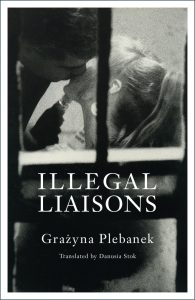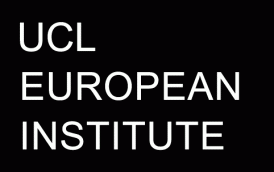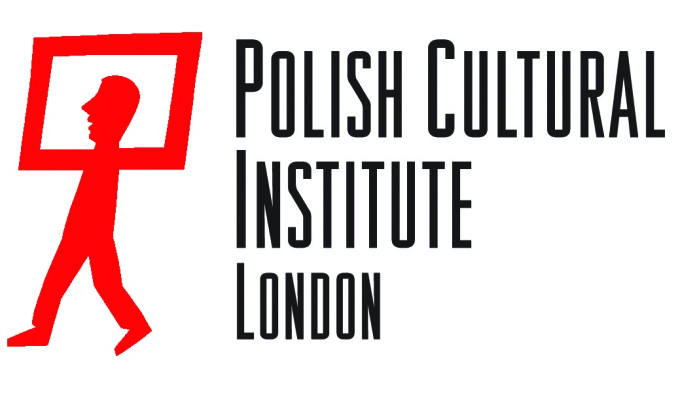New Europeans: myths, dreams or sort of reality
To accept differences, to embrace the fact that we’ll always be different: it’s a hard, fascinating, never ending work of defining and redefining. I’m grateful for it, I need this for myself and my writing…
1. Urszula Chowaniec: Grazyna, you came to London for the seminars which was devoted to your book “Illegal Liaisons” and the book of A.M. Bakalar “Madame Mephisto”, all around the theme of construction of New Europeans, do you in fact believe in the New Europe, this Europe, in the centre of which – in Brussels — you actually live?
GP: Actually I do. Maybe it’s the child in me that says “I do” but I let it speak. I benefited from the bringing together of European nations, a lot of people did, we can travel and work where we want. Obviously, it brings out nationalistic sentiments because the animals in us will always bristle at contact with strangers. But Europe is relatively small and the educated part of the younger generation already feels European. There is always a question if the blending together of cultures will not deprive us the unique qualities of each individual culture. But life means motion, it’s a natural process, I’m the last person to defend “the old order”.

2. UCH: Let’s talk about “Illegal Liaisons”, your first book in English beautifully published by Stork Press, in a moment, but first I would like to go back to your earlier works. Before “Illegal Liaisons you have written three books. In free translation their titles are “Girls from Portofino” (to be honest my favourite), “Box of Stilettos” and “A girl called Przystupa”. All of them are very important in Polish contemporary literature. They are telling the story of women in Poland, from the times of communism to the transformation into a free-market economy, to the time of Euro-emigration (Przystupa) and the new Europeans — the generation of people who feel in equal part citizens of Europe as of the country they grew up in. Is this an intentional literary project to draw a picture of what happened in Poland in last few decades from the point of view of female characters?
GP: I wrote “The girls from Portofino” because I was fed up by the myth of the Solidarity movement being monopolised by men. That’s why one of the characters smuggles illegal newspapers and distributes leaflets, because women did it too. I wrote the story of political and economic transformation from the perspective of girls and then young women, because we were there too, as active as men. On the other hand, I wanted to recreate a different world, the girly one, with all its quarrels, small intrigues and, above all, friendship. At the end of the day it is friendship that allows my four characters to survive. Girls from the same street in a typical district of blocks of flats survive in a reality dominated, on the one hand, by communist school, and, on the other, by the Catholic Church and the pressure of the traditional upbringing on top of that. The main character of “Box of Stilettos” Marta, who struggles to make a career in Poland after the transformation, in an era of “wild capitalism”, becomes pregnant and realises that her life doesn’t belong to her any more. Motherhood is not her private matter because as a pregnant woman she belongs to the society more than ever. She is forced to play a role, to fit into an image of the Mother, especially Mother Pole. She feels trapped. At the same time she fights to survive financially and professionally in a reality where women tend to get fired when they get pregnant. In “A Girl Called Przystupa” a twenty year-old woman from a small village leaves Poland to work as a cleaning lady in Europe. The story is written mostly from her point of view, or rather that of the Narrator, who follows her closely, commenting on New Europe’s reality like narrators did in a picaresque. It would be very difficult to write these stories from a male point of view. I felt that they belong to women and they were untold. I wanted to tell them. On the other hand, the main character of “Illegal liaisons” is Jonathan, a writer, a stay- at-home father, a man who fulfils a traditional female role. Women in this novel are strong, they work, earn money, they are successful. Megi, Jonathan’s wife is a lawyer working for an EU institution, but she takes an active part in the upbringing of their kids. Andrea, a journalist and Jonathan’s lover, uses her freedom as a woman; she doesn’t feel obliged to fulfil any traditional roles of wife or mother.
In my next novel I come back to a female perspective. The main character is a European by upbringing (she’s thirty years old, she’s too young to remember communism). She lives in Poland and in Europe, for her it’s not a question of “leaving her country”, it’s more a question of being mobile and following her own needs. Her sense of patriotism is very different from that of the older generations of Poles.
3. UCH: Coming back to “Illegal Liaisons”: this is your first book translated into English. Why did you choose this one?
GP: My English publisher, Stork Press, has chosen this novel because it’s a universal story of love and passion which can be understood everywhere. And it is understood, from what I hear now, a year after “Illegal liaisons” came out in England and last month in USA and Canada. Last week I was a guest of the International Festival of Authors in Toronto, now I have a promotion tour – Buffalo, Chicago, Boston, New York. Readers’ comments are similar to those in Poland, people find their own emotions in this story, they feel strongly about it.
4. UCH: Jonathan is constructed a bit as a background to emphasize the emancipation of women: professionally and economically successful Maggie and sexually liberated Andrea. Jonathan himself seems to be weak, submissive and indecisive (oh, I really did not like this character!) Can you tell me a little why did you decided to make him a protagonist? What was his main function? Perhaps I misread this character?
GP: Several days ago I talked to Lewis DeSoto, a writer who also was the guest at IFOA. We discussed “Illegal Liaisons” and at some point he told me: “Men are a mess!”. I must say that I don’t envy men nowadays. It is a time of transformation for them. Clearly they lost the certainty of what manhood means and they are in the process of defining it again. It’s a very interesting process in the post-feminist world but I believe it must be painful in everyday life. Jonathan is a man in transformation.
5. UCH: It is a spoiler but I disclose that the book has a sort of happy ending: the family stays together. Isn’t that a bit optimistic given that the New Europeans are more likely to end up in divorce than any other generation before, especially because the economic reasons to stay together are less and less important? Also, isn’t the ending a bit in line with a bourgeois morality?
GP: But we are also more attentive parents than we were ever before. In previous generations people had more children and parents didn’t have time to concentrate so much on them. Now kids are in the centre of our attention. Jonathan is one of these fathers who cut the umbilical cord, who is very active in the process of upbringing. Paradoxically, the love affair with Andrea makes him an even better father, it opens him up emotionally. It could also be “the guilt factor” so typical for Poles – a “bad” husband, Jonathan compensates by being a good parent. That’s why he’s not able to take responsibility for destroying his family. It’s not a weakness; it’s the overwhelming sense of responsibility in which we, parents, live nowadays.
6. UCH: One thing about the geography of the book: the new, liberated generation is located in Brussels, which is a symbol of New Europe, but also one of the cities with a big complex of its colonial past. Is this ideological dynamic important for your thinking about what is happening around you? In Illegal Liaisons there are no direct link to post-colonial theory, but there is the idea of Europe above a nation as a direct opposition to colonial ideas. (perhaps New Europe is a result of colonial failure?)
GP: I write about the colonial past and its consequences for daily life in Europe, and especially in Brussels, in my next novel. My main character meets both Belgians and Congolese people. She’s deprived of her “colonial virginity” in a painful way.
7. UCH: I would love you to elaborate a bit on the idea of contemporary writing and being a writer. You write and publish in Polish, hence in the traditional categories you are labelled as a Polish writer, also thematically your novels are linked to Poland, you comment on contemporary Poland etc. But you have been living abroad for years, and – as you explained it – it is your choice, mainly dictated by your curiosity of the world. Does this choice influence your writing?
GP: I react immediately if somebody wants to label me as an émigré writer. I travel because I feel a nomad. And because I like and because I can travel — the transition from communism gave us this precious opportunity, I’m grateful for this. I visit Poland whenever I like. There is no regret, no homesickness, no nostalgia. The same in “Illegal liaisons”, Megi and Jonathan do not miss Poland, because Poland is so close. They didn’t lose their country by leaving it. There is a fundamental difference between the generation of people who entered their adult life after 1989 and the earlier generations. The only influence on my writing manifests itself through a broadening of the subjects that interest me. I meet people from different cultures in Brussels, our contacts are deep enough to inspire me to write more than just about Poles and their mentality. This is the case of my latest novel (to be published in 2014). The question is if leaving our own cultural context makes us credible as storytellers. Musicians, painters and other artists don’t have this problem, writers are judged more strictly.
8. UCH: Do you feel an emigrant or migrant, a contemporary vagabond?
GP: A contemporary vagabond. Full stop.
9. UCH: To be away from your own culture often gives you a certain distance, clearer view: sometime you may find out that you actually do not like your own country and your own countrymen. Is there anything about Poland you particularly don’t like?
GP: Being away from my own culture gave me an important lesson – not to generalise, not slip into stereotypes, always have bigger perspective. Therefore I can say what I don’t like in particular Poles, but not in the whole Poland.
10. UCH: Ok, is there anything you miss about Poland? Does being abroad make you long for anything Polish (and please, do not refer to Polish cuisine, I do not believe a word about the mythical Polish delicatessen and I am a daughter of a fantastic cook)
GP: Sometimes I’m surprised that my Polish friends feel so strongly about something – politics, behaviour, a film, weather – and I don’t care… This realisation that “I don’t belong there in 100 per cent” brings about a bit of nostalgia. But as a matter-of-fact, without regrets.
11. UCH: You were a student of Izabela Filipiak, an excellent Polish writer and a very important voice against taboos and bad practices in Polish culture (for example in her columns in various magazines, later published as the Culture of the Offended). Did she influence your way of thinking about writing, the choice of subjects, the way you construct the narrative?
GP: She introduced me to the theory of feminism. I wrote my MA thesis from a feminist perspective when gender studies didn’t exist in Poland. When I joined Filipiak’s group several years later, gender studies were already formed. What I knew instinctively before and I analysed in my MA thesis, I found in the theory books I had to read for Filipiak’s classes. That was reassuring. She liked my first short story, it was important. She was also very supportive when I published my first novel. She was one of these teachers who inspires, triggers something in students. A rare, precious gift.
12. UCH: Who are your teachers of fiction writing? Who influenced you most?
GP: In June 2013 I published a volume of essays “The Robber Maid’s Daughters” about my teachers of fiction writing. I can add here several more: Nabokov, Calvino, Eco, Marquez, Irving. Polish female writers: Jadwiga Żylińska, Zofia Nałkowska.
13. UCH: A word for conclusion?
GP: I feel like I “entered Europe” more than decade ago when I moved from Poland to Sweden but only now I feel that I see more of it. I found a space in my mind, in me to understand people from different cultures. To accept differences, to embrace the fact that we’ll always be different: it’s a hard, fascinating, never ending work of defining and redefining. I’m grateful for it, I need this for myself and my writing.
March-December 2013




Recent Comments